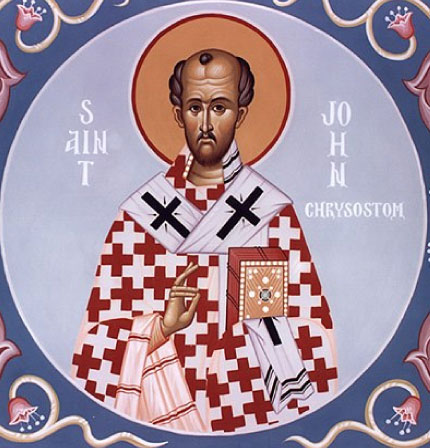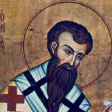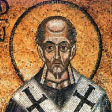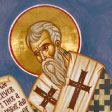Saint John Chrysostom

The Life and Ministry of Saint John Chrysostom
The life of Saint John Chrysostom, one of the greatest preachers and theologians of the Orthodox Church, stands as a luminous testament to the transformative power of divine grace and the enduring strength of the Gospel. His very name, "Chrysostom," meaning "Golden-Mouthed," reflects the brilliance of his eloquence and the piercing clarity of his sermons. Yet, beyond his rhetorical mastery lies the profound witness of a life shaped by ascetic rigor, unwavering courage, and an unwavering commitment to truth. Saint John’s legacy is not only enshrined in his writings but also in his bold defense of the faith and compassionate pastoral care for the marginalized.
Early Life and Education
Saint John Chrysostom was born in Antioch around 349 AD to a noble and devout family. His father, Secundus, a high-ranking military officer, died when John was still an infant. His mother, Anthusa, a woman of remarkable piety and virtue, raised him with deep Christian principles, instilling in him the seeds of faith that would later blossom into sainthood.
Antioch, a vibrant and cosmopolitan city, was an intellectual hub in the ancient world. John received an exceptional classical education under the renowned pagan orator Libanius. Immersed in the study of rhetoric, philosophy, and literature, he excelled in the art of persuasion and eloquence. Yet, despite the allure of worldly success, John felt the quiet calling of God stirring within his heart.
Inspired by the ascetic life of the desert fathers, John withdrew from secular pursuits and dedicated himself to the study of Scripture and prayer. Under the spiritual guidance of Bishop Meletius of Antioch, he was baptized as an adult and soon began his theological training. His heart, set aflame by divine love, longed for the solitary life of a monk. For several years, he lived in a cave outside Antioch, practicing extreme asceticism. This period of rigorous fasting and prayer left him physically weakened but spiritually fortified, preparing him for the pastoral work that lay ahead.
Ordination and Early Ministry
In 381 AD, John was ordained a deacon by Bishop Meletius and later a priest by Flavian I of Antioch. His gifts as a preacher soon became evident, drawing large crowds who thirsted for his expositions of Holy Scripture. His homilies, marked by their clarity, moral urgency, and pastoral sensitivity, spoke to the hearts of both the learned and the simple.
Saint John’s sermons were a mirror to the society of his time, confronting the moral laxity, greed, and injustices that plagued the city. He called upon the faithful to embrace humility, charity, and repentance. His words were not gentle platitudes but a fiery summons to live in accordance with the Gospel.
His preaching extended beyond the pulpit. Saint John became known for his acts of charity, establishing hospitals, shelters, and initiatives for the poor and marginalized. He viewed the Church not merely as a sanctuary for worship but as a living embodiment of Christ’s love, radiating compassion and justice to all corners of society.
The Archbishop of Constantinople
In 397 AD, John was appointed Archbishop of Constantinople, the capital of the Eastern Roman Empire. His elevation to this prestigious office, however, was not without controversy. Brought to the city almost by force, John found himself thrust into the political and ecclesiastical tensions of the imperial court.
As archbishop, John Chrysostom sought to reform the Church, addressing the corruption and opulence that had crept into the clergy and the aristocracy. His ascetic lifestyle and fearless denunciation of excess stood in stark contrast to the luxurious life of the imperial court. He preached against the moral decay of the elite, emphasizing the necessity of humility and service.
One of his most memorable homilies was directed at Empress Eudoxia, whom he accused of vanity and extravagance. "Again Herodias rages," he proclaimed, likening her to the infamous Herodias who sought the death of John the Baptist. Such boldness won him enemies among the powerful, and despite his popularity with the common people, opposition to his ministry grew.
Exile and Trials
John’s enemies, including influential clergy and courtiers, conspired against him. In 403 AD, through a synod convened by his adversaries, John was deposed and exiled. However, a riot by the people of Constantinople and an earthquake—interpreted as a sign of divine displeasure—led to his swift reinstatement.
His return was short-lived. In 404 AD, following further clashes with Empress Eudoxia, he was exiled again, this time to the remote region of Armenia. From there, he continued to write letters and treatises, strengthening the faithful and encouraging his supporters. Even in exile, his influence could not be silenced. His final exile came in 407 AD, during a forced march to a more distant outpost. Exhausted by the harsh conditions, Saint John Chrysostom reposed in the Lord, his final words echoing the essence of his life: "Glory to God for all things."
Legacy and Canonization
Saint John’s exile could not obscure his light. In 438 AD, his relics were brought back to Constantinople with great reverence by Emperor Theodosius II, who sought to atone for the injustices done to the saint. His canonization swiftly followed, and the Church recognized him as one of the greatest Fathers and Teachers.
Saint John Chrysostom’s contributions to Orthodox liturgy and theology remain profound. The Divine Liturgy of Saint John Chrysostom, celebrated regularly in the Orthodox Church, bears his name and reflects his emphasis on repentance, thanksgiving, and the mystical union with Christ. His writings, including his homilies on the Gospels, the Pauline Epistles, and his treatises on prayer, continue to nourish the faithful to this day.
Spiritual Lessons from His Life
Saint John Chrysostom’s life offers timeless lessons for Christians today. His unwavering commitment to truth, even at great personal cost, reminds us that fidelity to Christ often demands courage and sacrifice. His compassion for the poor and marginalized challenges us to embody the love of Christ in our communities.
Above all, his humility and trust in divine providence serve as a beacon of hope. Though he faced exile, slander, and suffering, Saint John’s heart remained fixed upon the eternal Kingdom. His example calls us to live not for the fleeting accolades of this world but for the imperishable crown of righteousness.
In every age, the voice of Saint John Chrysostom resounds—a golden voice, calling us to repentance, to charity, and to the unshakable joy found only in communion with our Lord Jesus Christ. May his prayers and teachings continue to inspire and guide us on the path to salvation.







